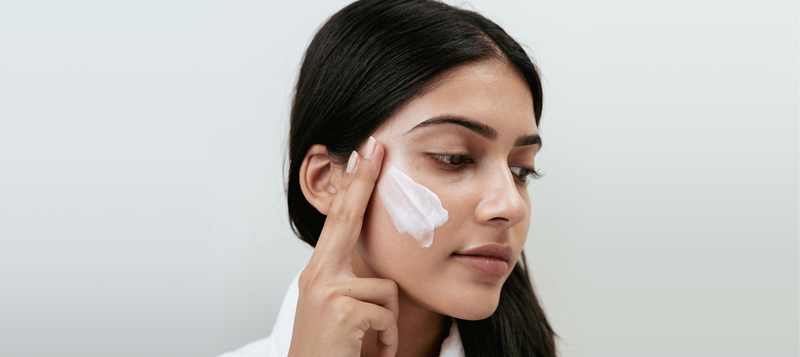Hydration is the key to a healthy skin. Whereas, moisturisation is essential if you want to retain the moisture in your skin for longer.
Both the terms—undoubtedly—are different.
Then why do most people think hydration and moisturisation are the same thing?
Perhaps they have the same effect?
Honestly, it’s quite tricky to differentiate between the two—but we have done the work for you—we are going to end the hydrating vs moisturising debate in this blog.
First, let’s get a basic understanding of both.
What is a moisturiser?
Moisturisers increase the water content in the skin and restore/strengthen the skin barrier function.
Actually, there is no specific definition for the term moisturiser—since it is marketing jargon for products that are specifically formulated to provide essential moisture to the skin.
Moisturising ingredients soothe inflamed skin, reduce skin itchiness, and promote wound healing acceleration, according to a 2017 study
There are typically two types of moisturising agents: emollients and occlusives.
Made up of lipids, emollients fill in corneocyte cluster gaps to make the skin smooth and hydrated.
Occlusives are known for maintaining water content in the skin and preventing trans-epidermal water loss—providing long-lasting hydration to the skin.
With a combination of emollients and occlusives, moisturisers improve the skin’s barrier function and maintain the skin’s integrity—improving the overall appearance of the skin.
What is a hydrator?
Hydrators, also known as humectants, attract water and help hydrate the skin.
How a hydrator works significantly depends on the environment.
If where you live, the humidity level is less than 50%, a hydrator can attract the water content from the deeper layers of your skin to provide hydration to your outermost layer. Whereas, if the humidity level is more than 50%, a hydrator can bind the moisture from the environment to your skin.
However, unlike emollients and occlusives, humectants do not trap the water content in your skin—their job is to only increase the hydration.
What is the difference between a hydrator and a moisturiser?
Hydrators and moisturisers work differently—but in some ways, they have the same effect—which is making skin smooth, supple, and soft.
Hydrators attract moisture from the air or deeper layers of skin to hydrate the stratum corneum, whereas moisturisers improve the skin’s barrier function, locking in the moisture content and preventing water loss.
Both hydrators and moisturisers are suitable for all skin types. Hydrators are mainly recommended for individuals with dry and dehydrated skin. Whereas, moisturisers are ideal for dry and mature skin.
How to know whether a skincare product contains moisturiser or a hydrator?
It’s important to know whether the skin care product you are using contains moisturising or hydrating agents. Only then, you can fully understand how the product works and how it can benefit your skin.
|
Ingredient |
Moisturiser or hydrator |
|
Beeswax |
Moisturiser |
|
Mineral oil |
Moisturiser |
|
glycerin |
hydrator |
|
aloe |
hydrator |
|
Mineral oil |
Moisturiser |
|
Petroleum jelly |
Moisturiser |
|
nut or seed oil, such as coconut, almond, hemp |
Moisturiser |
|
lanolin |
Moisturiser |
|
hyaluronic acid |
hydrator |
|
shea butter |
Moisturiser |
|
plant oils, such as squalene, jojoba, rosehip, tea tree |
Moisturiser |
|
citric acid |
hydrator |
|
lactic acid |
hydrator |
How do I know if my skin needs moisturisation or hydration?
Many skincare products contain both moisturising and hydrating ingredients. Thus, they can increase the water content in your skin and help lock in the moisture—for long-lasting hydration.
But if you were to pick between a moisturising and hydrating ingredient—take your skin type into consideration.
For dry skin
If your skin always feels tight and patchy, irrespective of the weather conditions, you should go for a skincare product that contains both hydrators and moisturisers.
Because, it’s quite evident that your skin is having a hard time drawing in water—and more importantly—it’s unable to retain water.
So a product containing both will hydrate your skin and prevent moisture loss.
For dehydrated skin
Dehydrated skin is a condition that can affect individuals of all skin types. It is caused by less dietary water intake, weather conditions, excessive sweating, etc.
In this condition, wrinkles and fine lines are more prominent due to the lower water content in the stratum corneum—thus you can go for hydrating ingredients—such as Hyaluronic Acid.
For oily skin
Excess shine or oil on the face does not necessarily mean that the skin cannot be dehydrated. Oily skin, wherein the skin produces sebum more than required, is a result of a compromised skin barrier.
In this, the skin is unable to retain moisture, making the skin dehydrated and impelling the skin to produce more oil. This entire process keeps happening again and again—so the only way to stop it—or to provide your skin with proper moisture—is to use products containing both moisturising and hydrating ingredients.





























